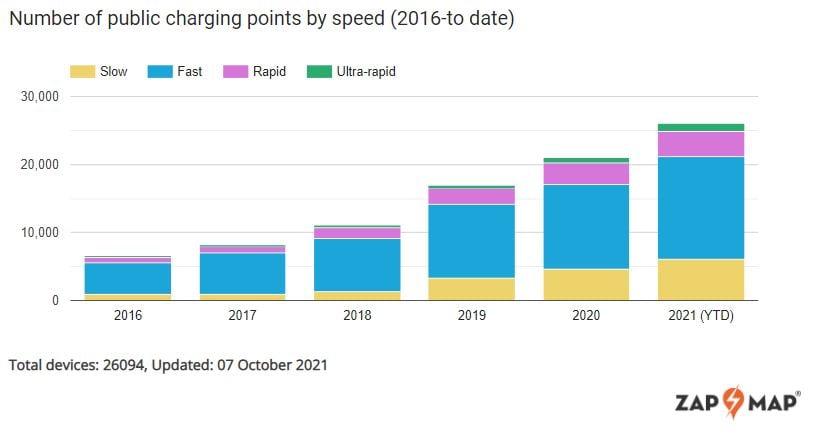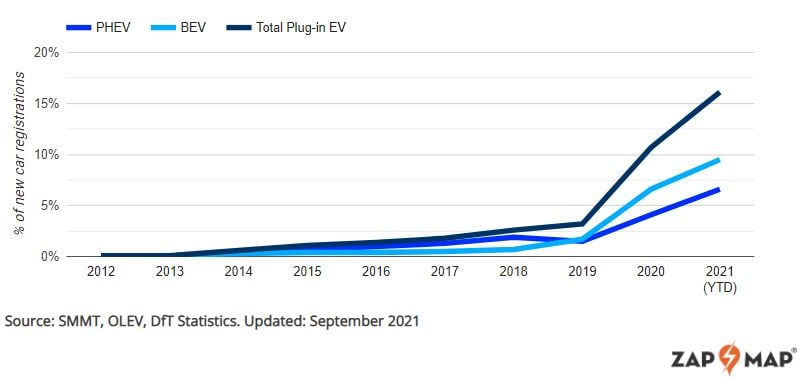How the electric vehicle landscape has changed
Author: Natalie Banks - Digital Marketing Specialist
Convenience of owning an Electric Vehicle
There are a multitude of conveniences associated with owning an Electric Vehicle, all of which can have an effect on the popularity or interest of an EV.
Fewer moving parts
One of the main noticeable differences of an electric vehicle compared to one with a conventional combustion engine is that there are fewer moving parts (timing belt, water pump etc), meaning that there are less opportunities for things to go wrong.
The reduced maintenance costs are an attractive selling point for some, with others preferring the convenience of not having to arrange regular servicing.
Lower running costs
One of the most attractive features of an electric car is the low running costs. Where a full tank of fuel will generally cost between £30 and £60, depending on the capacity of your tank, an electric vehicle can be charged to full for as little as just £5. Whilst this might seem appealing to most, there are still some considerations to make here around the range of the vehicle, which we will cover later in the article.
Improved infrastructure
In the past, and even up to recently, the electric vehicle infrastructure has not been large enough to accommodate the growing trend of electric vehicles.
With the government pushing the electric vehicle movement, the infrastructure has been improving simultaneously.

As we can see in the statistics provided by ZapMap.com, the introduction of electric charge points is increasing year on year, with more rapid and ultra-rapid charge points across the country than ever before.
But is this infrastructure growing in line with the registration of electric vehicles? It seems not, as 2021 has seen a 95% growth in EV sales when comparing 2021 to 2020 (up until the end of September). By September 2021, over 16% of new car registrations were electric vehicles.

Not having to visit petrol stations
The notion of having to fill a car up with fuel can be both an inconvenience and an added cost, which leaves the car owner generally feeling dissatisfied when the time comes to refuel. Electric vehicles can be charged from your home, for example overnight, which is more convenient than having to drive to a fuel station when you are running low.
For some however, the convenience of just nipping to the petrol station can be a much better experience than realising you forgot to put your electric vehicle on charge ready for the morning.
Interest in EV’s during fuel crisis
The latest ‘fuel crisis’ has been a stressful situation for lots of people; those needing to get to and from work, delivery drivers needing to get crucial supplies to those who need them and even those needing to get their children to and from school.
This fuel crisis, or simple fuel shortage, has only affected those who own conventional petrol and diesel vehicles, but electric vehicle owners have come off unscathed.
So, how has the fuel shortage affected the interest in electric vehicles?
It’s interesting to note how people react to an environmental issue such as a fuel crisis and we can see from Google Trends analysis that searches for ‘Electric Cars’ has increased during the period of 24th – 29th September, when there was heightened news coverage and general panic.

We know that interest in electric vehicles has been on the rise, especially over the past few years, but there has been a clear spike in interest in electric vehicles during the final week of September 2021, which coincides with the fuel crisis. Here, we can see the Google Trends graph for the search term ‘EV’.

One other observation is that fuel prices have increased over the recent years, and with the recent fuel shortage, prices have crept up near to an all time high according to a recent study by the RAC.
Considerations of owning an Electric Vehicle
When considering an electric vehicle, you should first establish whether an electric vehicle is right for you and your needs otherwise you might find yourself more inconvenienced.
Range/driving habits
The term ‘electric vehicle’ is an all encompassing name for any electric vehicle, whether that is pure electric or a plug-in hybrid. Anything that used some form of electricity to power the components is categories as an electric vehicle.
With a battery holding the power to the motor, the capacity is limited and the way the car is driven can affect the range, similar to a conventional engine.
More fuel is used in certain circumstances such as driving erratically or having the air condition system running for the duration of your journey. This is the same with electric cars – there isn’t an endless supply of power stored and this is used up quicker in certain circumstances.
It’s not all about bad driving habits however, it often boils down to how often you travel long distances. If you will be making journeys that are regularly in excess of 40 miles, you might benefit most from a plug-in hybrid that can switch to petrol reserves where necessary, whereas if you make regular short journeys of 10-20 miles, a pure electric vehicle might be the more economical option for you.
Location
Where you live or work is an important consideration when it comes to your electric vehicle buying journey. If you live in a more remote area where the public charge point infrastructure is poorer, it might make it more inconvenient for you than it would if you lived in a built-up area with plenty of charge points.
Living in a remote area also means that you are likely to need to drive further to access amenities so will use your power supply much quicker by travelling longer journeys.
With home charging points, you will need to have a charging port fitted which will also see a trailing cable when the vehicle is on charge. If you don’t have a driveway or garage and rely on on-street parking, a trailing cable is not an ideal solution.
There is an additional cost to have a home charge point fitted if you don’t already have one, but government grants are available.
Upfront costs
The upfront cost of an electric vehicle is generally higher than a conventional petrol or diesel car, but is outweighed by the reduced running costs.
Finding the upfront cost is something to consider, whether it’s through a cash payment or a bank loan. Of course, there are also finance offers available, but these may cost more per month due to the higher upfront cost.
Introduction of new Electric Vehicles
In recent years, manufacturers have introduced more EV options to the market, meaning there’s more choice now than ever before. Some of the most popular cars on the market now have an electric variant available.
If we take a look at Ford, there’s now seven electric & hybrid options available, from compact hatchbacks to commercial vehicles, with something for almost every possible requirement. Some of Ford’s most popular models, including the Fiesta, Focus, Mustang and Mondeo are available as an electric vehicle.
London’s Ultra-low emissions zone
With the introduction of London’s ultra-low emissions zones, which are due to be rolled out to other cities across the country, electric vehicles can not only travel freely through these areas, but they avoid the charges associated with these zones.

